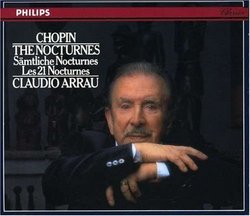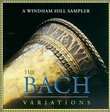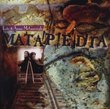| All Artists: Frederic Chopin, Claudio Arrau Title: Chopin: The Nocturnes Members Wishing: 0 Total Copies: 0 Label: Polygram Records Release Date: 10/22/2002 Genre: Classical Style: Number of Discs: 2 SwapaCD Credits: 2 UPC: 028941644022 |
Search - Frederic Chopin, Claudio Arrau :: Chopin: The Nocturnes
 | Frederic Chopin, Claudio Arrau Chopin: The Nocturnes Genre: Classical
|
Larger Image |
CD DetailsSimilarly Requested CDs
|
CD ReviewsThe summit (forgive me, Artur Rubinstein!) John Grabowski | USA | 06/10/2005 (5 out of 5 stars) "If anyone wanted an introduction to the late Chilean pianist Claudio Arrau, and why I think he's one of the greatest pianists of the 20th century, I'd point them to this set. This is some of the most distinctive Chopin playing I've ever heard, beautifully-recorded. I've been comparing this to Rubinstein's set all week and Arrau comes out on top almost every time. Some people may find his push-pull rubato a little too much, but I like it here. Listen to how he never repeats a phrase exactly. Each time he plays it he caresses a different note, a different part of the phrase, accents a different beat ever so slightly. There's no such thing as "passage work" with Arrau. He has said that every note in a piece is equally important, and he plays these works that way, rather than as just light dreamy moonlight pieces, and thus brings out demons in them I've never heard before. For just one of many examples, listen to the pedal just before the coda in the Second Nocturne, Op. 9. No one does moments like that like Arrau--he makes a very special statement effortlessly, without flash or drama. His recordings reward careful, repeated listening, and bore those searching for surface flair. It's interesting to note that he considered the Nocturnes to be the peak of Chopin's output, an extraordinary view. Most other pianists--Rubinstein is a fine example--handle the Nocturnes as small parlor pieces, but Arrau gives them a big-scale treatment. You could argue they lose some of their intimate charm, their old fashioned quality, this way, like listening to Mozart chamber music through a bullhorn, but I think Arrau's interpretation has a lot going for it. He brings out a certain agitation in No. 2 in Op. 37 in G-major, that other pianists miss. He finds moonlight and mystery in the constantly changing figurations of No. 1 in B-flat minor--again, no such thing as passagework. I find these larger-than-life readings to be very satisfying, and despite Arrau's approach he manages to find plenty of small-scale charm in, say, Op. 15, No. 2. But what makes this set special to me is the extra material he mines from works like Op. 15, No. 1, here played more disturbingly than ones normally hears it. And, if you're in the mood for the drawing room approach, you should also have your Rubinstein set handy. And while I am a great admirier of Pires, I find her set, beautifully-played, to be a little intellectually lightweight compared to these. Don't listen to those who say either 1) Chopin played his works without a lot of rubato, or 2) there is heavy breathing here that makes these unlistenable. No one knows what Chopin played these works like--there was no recording then, obviously, and a verbal description is not reliable since everything is relative--what was considered "not a lot of rubato" in 1840 could be a lot today, just as meat that was "not very salty" in 1840 would probably assault our tastebuds today. Chopin's direct descendants were recorded, however, or many of them were, and they played his works with great freedom, rhythmic and otherwise. This fact, coupled with the knowledge that slavish workship of the printed note did not take effect until the second half of the 20th century, makes me suspect anyone who says Chopin did not want his works played this way or that way. As for Arrau's "breathing," I don't find it particularly bothersome. Anyone saying this makes the discs "unlistenable" must be a child of the electronic music age, and probably could not keep his concentration in a concert hall surrounded by people who are all, we hope, breathing." Exquisite playing P. Kelley | SC United States | 07/04/2006 (5 out of 5 stars) "Anyone who thinks that Chopin's nocturnes are not "technically" demanding has obviously never spent time studying them. They are quintessential Chopin and demand infinite attention to matters of touch, pedalling, and tone production from start to finish A hasty or shallow performance, such as might work with the Fantaisie-Imromptu, for instance, will not suffice here. To play them well is no small task and requires a great deal of emotional investment tempered by a controlled technique; fortunately Arrau is up to the challenge, as this recording attests." Too Much Rubato, Eh? Moldyoldie | Motown, USA | 07/29/2007 (5 out of 5 stars) "Nocturne: "A pensive, lyrical piece of music, especially for the piano." Or according to Wikipedia: "A nocturne (from the French for "nocturnal") is usually a musical composition that is inspired by, or evocative of, the night." I'll add that Chopin's Nocturnes are also very nice for Sunday morning. This is some of the most beautiful music ever composed.
I'm not expert enough to gauge the viability of different interpretations; many seem to be critical of Arrau's use of rubato, or a flexible tempo not strictly on the beat. To me, it's academic. Anyone not moved and unwound by these pieces as presented here has no soul...period." |

 Track Listings (11) - Disc #1
Track Listings (11) - Disc #1







